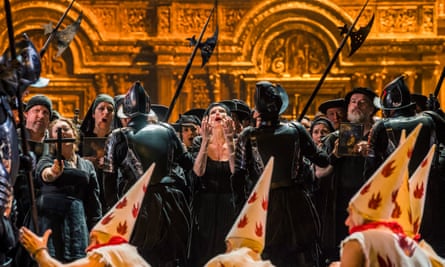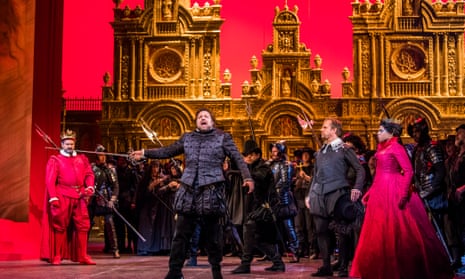Sixteenth-century Spain resembles a prison or a madhouse in Nicholas Hytner’s Royal Opera production of Don Carlo, first seen in 2008, now on its third revival. Though it has its flaws, it reminds us of the innate bleakness of Verdi’s vision, with its irresolvable clashes between church and state, liberalism and oppression, politics and desire.
Black walls with grilles hem the characters in on every side, even in the gardens of the San Yuste monastery, where Ekaterina Semenchuk’s Eboli entertains the court ladies with her veil song, and Ildar Abdrazakov’s Philip and Christoph Pohl’s Posa discuss atrocities in Flanders as the sky turns a bloody red.
Chiaroscuro lighting picks out both the near omnipresent glint of armour and sinister processionals of black-robed, Inquisitorial figures. The atmosphere is fetid with danger. The contrast with the opening scene at Fontainebleau, where Bryan Hymel’s Carlo falls in love with Kristin Lewis’s Elisabetta in a vast, white open space and there is a sense of freedom and ease, could not be more pronounced.
Occasionally, however, the stagecraft falters. The set is at times overly mobile, breaking the oppressive mood as heavy columns are flown in and out and Charles V’s imposing tomb suddenly glides across the floor in the first San Yuste scene. The auto-da-fé, deemed problematic when the production was new, has been simplified and rethought, and now comes without its blazing fires and pyres. But it remains curiously cluttered and unfocussed, by no means the climactic moment of grandeur and horror that it should be.

The work’s scale and complexity make it difficult to perform successfully, and musically, this is a variable evening, in which some fine individual achievements don’t always cohere into a satisfactory whole. Hymel is singing Carlo for the first time, and does so gloriously, with real ardour in his voice, ringing top notes that go on for ever, and a wonderful, innate sense of Verdian lyricism. Semenchuk, like many Ebolis, finds the veil song’s coloratura tricky, but is splendid thereafter: O Don Fatale, all voluptuous anguish, is a real high point. Pohl, meanwhile, an impeccable singer-actor, gives the evening’s subtlest performance, beautifully characterised and sung with wonderfully expressive restraint: you really believe in this man’s political passion and dignity.
Lewis and Abdrazakov, however, arouse more mixed feelings. Lewis, strong on stage, admirably charts Elisabetta’s progress from spirited girl to unhappy wife, but her tone can turn uncomfortably shrill in her upper registers. Abdrazakov, a younger, more-handsome Phillip than most, sounds good, as he always does, and really convinces in moments of vulnerability. He’s less successful, however, in suggesting the implacable public authority that masks the private despair. Conductor Bertrand de Billy, meanwhile, is acutely alert to Verdi’s complex orchestral textures and brooding sonorities, but could on occasion propel the score forward with a bit more momentum. The playing and choral singing are outstanding.
- At Royal Opera House, London, until 29 May. Box office: 020-7304-4000.

Comments (…)
Sign in or create your Guardian account to join the discussion